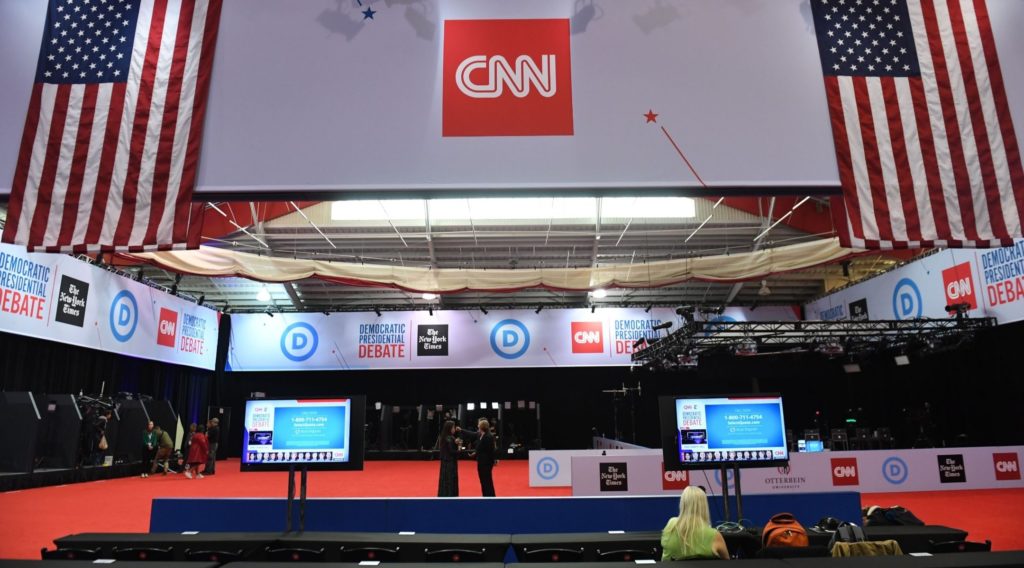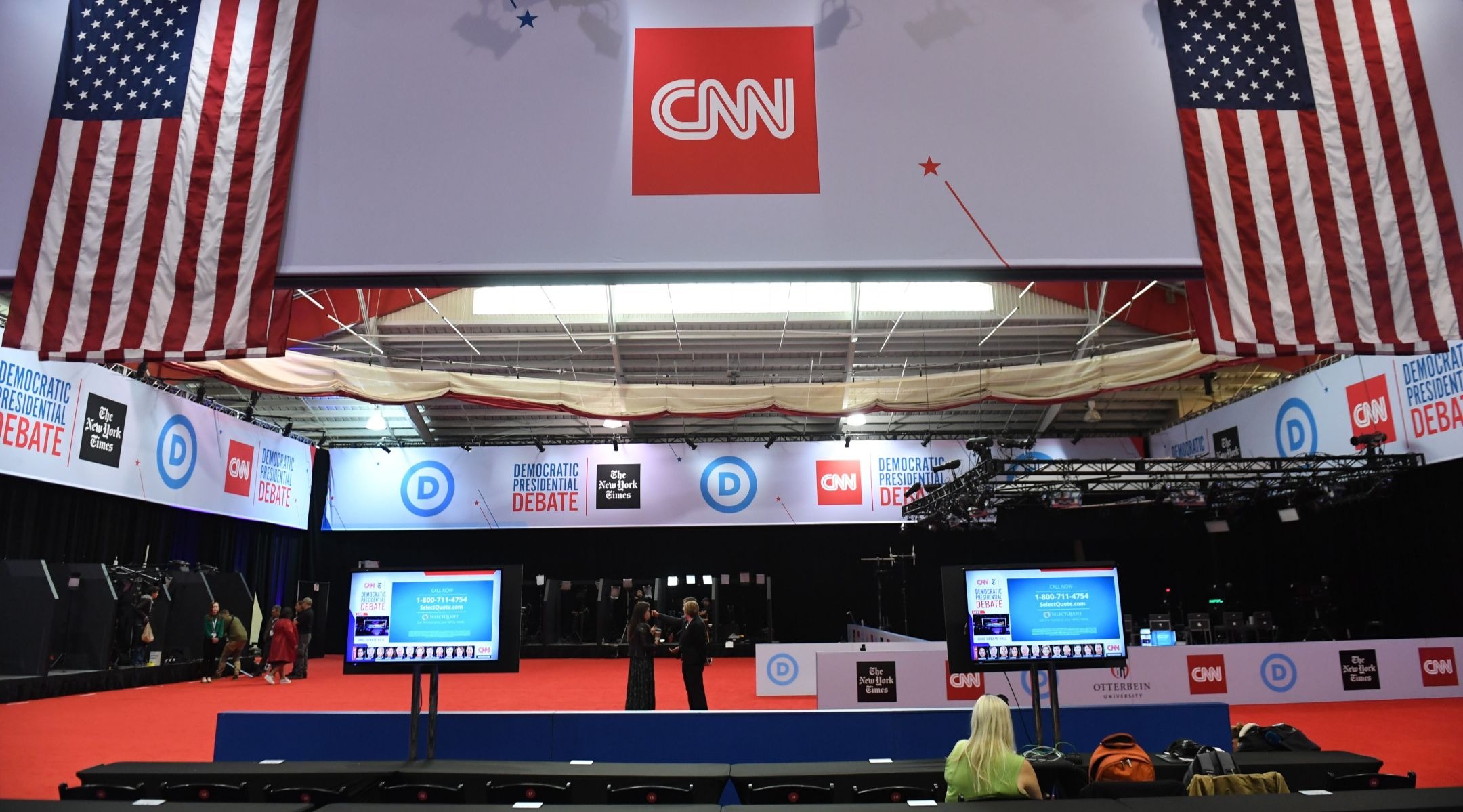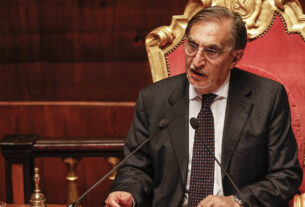
WESTERVILLE, Ohio (JTA) — Twelve candidates will crowd the debate stage tonight at Otterbein University in a suburb of Columbus, the capital of Ohio, a key swing state Democrats hope to regain after losing it to President Donald Trump in 2016.
As the chaos in Syria unfolds, expect foreign policy to be a main feature of the discussion — unlike in the past few debates. Foreign policy wonks were left searching for crumbs after those, in which the focus was chiefly on bread and butter issues like health care and education costs.
Bread and butter will loom large in a rust belt state that still hurts because of job losses over the last two decades, but Democrats will undoubtedly seize on the opportunity to unite in bashing Trump for a move that has been harshly condemned even by some of his Republican allies — giving Turkey the green light to invade Syria and target its pro-American Kurdish minority.
Here are five things from a Jewish perspective to watch for when Democrats take the stage:
1. An unstable Syria is a threat to Israel.
Trump had for the first two and a half years of his term dominated the pro-Israel space by pulling out of the Iran nuclear deal that Israel’s government reviled, moving the U.S. embassy from Tel Aviv to Jerusalem, recognizing Israel’s claim to the Golan Heights and running a peace process that, while ultimately stalled, tilted heavily toward Israel.
It was a record that led Trump to believe he could accuse Jewish voters of “disloyalty” for voting for Democrats, and for him to call the Democratic Party anti-Semitic. Not helping was the party’s left-wing, which has increasingly questioned the parameters of the U.S.-Israel relationship, and comments by two freshman congresswomen that were seen as involving anti-Semitic tropes.
But Trump’s orders in recent weeks to pull U.S. troops out of Syria has drawn protests of alarm in Israel. No U.S. presence in Syria makes it much more likely that Iran, which openly calls for Israel’s destruction — and is a key backer of the Syrian Assad regime — will set up a permanent stake in the country. Furthermore, the U.S.’ abandonment of a close ally like the Kurds is not a harbinger of good things for Israel.
Even Israeli Prime Minister Benjamin Netanyahu, who is next to no world leader in his friendship with Trump, has decried the decision (while not naming Trump directly).
Expect the Democratic candidates to frame their condemnation of Trump’s retreat as endangering Israel, and to try to reclaim some of the pro-Israel territory their party has lost.
2. Tulsi Gabbard could have a tough time.
Rep. Tulsi Gabbard, D-Hawaii, a veteran, has in the past sounded conciliatory toward Assad, calling his opponents “terrorists” and meeting with him without informing Democratic party leaders.
She also has echoed some of Trump’s “end to endless wars” rhetoric in calling for withdrawals of U.S. troops from the Middle East and elsewhere. She has in the past blamed Netanyahu and “neocons” for endangering U.S. interests in the region, and in the process has staked out a tiny but loud isolationist wing of the Democratic Party.
Gabbard has clarified some of her past comments, and has since called Assad a “brutal dictator.” She has also condemned Trump for mishandling the Syria pullout.
Still, the debate moderators and her opponents will likely scrutinize these past Syria associations Tuesday night. Watch for how she reacts when she’s in a defensive crouch — does she invoke pro-Israel neoconservatives?
3. How are you feeling, Bernie?
Bernie Sanders, the Vermont senator who through tireless campaigning in 2016 made history by becoming the first Jewish candidate to win major nominating contests, had a heart attack last month. He has vowed that it will not impede his campaigning.
The 78-year-old has returned to a robust schedule and his rivals on the stage are unlikely to bring his health up — Rep. Eric Swalwell, D-Calif., who has since quit the race, took hits for making age an issue in the first debate, and former Housing Secretary Julian Castro didn’t do himself any favors when he appeared to mock former Vice President Joe Biden’s age in the last debate.
But moderators will not let Sanders off the hook, and he will have to reassure the voters who he appears to be losing to fellow progressive Sen. Elizabeth Warren, D-Mass.
4. Expect plenty of impeachment talk, involving Ukraine’s Jewish president.
The impeachment machine shifted into high gear after revelations last month that Trump had pressured Ukraine into prosecuting Biden, on the basis of no evidence.
A lot of the players in this burgeoning scandal are Jewish, chief among them the country’s president, Volodymyr Zelensky, but also two Ukrainian-American businessmen with ties to Trump and his lawyer, Rudy Giuliani, who were just arrested on campaign finance violation charges.
Lev Parnas and Igor Fruman have close ties to Jewish institutional figures stateside and in Ukraine. No candidate will mention their Jewish identity, but for Jewish debate watchers, the wince factor will be high every time any of these players are mentioned.
5. Rising anti-Semitism might get mentioned on the big stage.
The one issue that has consistently loomed large in each of the last three debates has been the perception among Democrats that Trump’s blunt-edged nationalism and anti-immigrant rhetoric fuels all kinds of bigotry, including anti-Semitism.
That theme, and at least a mention of anti-Semitism, is likely to show up in the fourth debate, for three reasons:
- An anti-Semitic white supremacist opened fire outside of a German synagogue on Yom Kippur, killing two people and rekindling concerns about rising anti-Semitism around the world. Trump had earlier this year played down the importance of far-right terrorism, rolling back and shutting down programs to address it, although last month his Department of Homeland Security once again made white nationalist violence a priority.
- The other major role Jews are playing in the impeachment scandal is the actual prosecution. Three of the House committees leading the impeachment charge are chaired by Jewish lawmakers: Adam Schiff of California (Intelligence), Eliot Engel of New York (Foreign Affairs) and Jerry Nadler of New York (Judiciary). Some Democrats — including Alexandria Ocasio-Cortez — have described attacks on Schiff by Trump and his coterie as crossing over into anti-Semitism, and those charges could figure in the debate.
- Tom Steyer, the billionaire philanthropist who was among the first to call for Trump’s impeachment, has for the first time qualified for the debate stage. Steyer’s father is Jewish, and a rabbi officiated at his wedding, although he now attends an Episcopalian church. But Republican attacks on Democratic funders have placed him in a trio with two other liberal philanthropists who are Jewish, George Soros and Michael Bloomberg. That’s a grouping that white supremacists (who generally don’t note or care that Steyer no longer practices Judaism) have for years used to argue that Jewish influence is nefarious and pervasive. Steyer has said the attacks are anti-Semitic, and he may bring that up during the debate.




